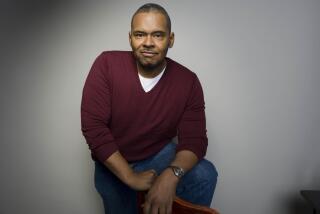An Unusual Goodbye at a Usual Haunt
- Share via
My instinct tells me there’s no such thing as “always.” My instinct tells me there’s no such thing as “forever.” It’s just “now.”
--Don Simpson, in a made-for-Morton’s video
*
Don Simpson, everyone agreed, would have loved it: A standing-room-only turnout of industry heavyweights flocking to Morton’s on Monday night. Filing past a poster-size picture of the producer, surrounded by his image on nine TV screens, 500 of them came to embrace a curtailed but colorful life.
For Simpson personified Hollywood--both its pitfalls and its dreams. The movie-obsessed son of strict fundamentalists, he had a deep-seated thirst for fortune and fame only partially assuaged by blockbusters such as “Flashdance,” “Top Gun” and “Beverly Hills Cop.” A victim of excess and the fast-track life, he rode a physical and emotional roller coaster that culminated in his death on Jan. 19 at age 52.
“Don wanted to live the way he did and never made excuses,” said Simpson’s longtime partner Jerry Bruckheimer, who hosted the event with ICM president Jim Wiatt, DreamWorks SKG principal Jeffrey Katzenberg and producer Steve Tisch, and who was the sole public speaker at the Morton’s gathering. “There are a lot of frauds out there, but he walked it like he talked it. Don was an original--the real thing.”
Simpson was his mentor when he came out to California two decades ago, Katzenberg recalled. “Around Don, every aspect of every day was magnified in its intensity,” he said of the man who, as head of worldwide production for Paramount Pictures, was instrumental in the making of hits such as “American Gigolo,” “48 HRS.” and “An Officer and a Gentleman.” “The fun was more fun. The drama was more dramatic. Nothing in life was ordinary.”
In the button-down, MBA-dominated Hollywood of the 1990s, Simpson’s freewheeling ways and shoot-from-the-hip style triggered memories of days past.
“Don is the ‘used-to-be’ of our generation,” said producer and former Columbia studio chief Dawn Steel, whom Simpson plucked out of “Star Trek” merchandising during their Paramount days. “This is ‘The Way We Were’ . . . and the way the industry was, for that matter. The business is all about money now, and Don was all about passion. Like John Kennedy and Elvis, he had to go early. I could never picture him getting old.”
Like most of those in attendance, producer Lynda Obst was dry-eyed but emotional. “Like Elvis, Don died in the bathroom for our sins,” she said.
Drawing on a cinematic analogy, Tisch compared the evening to Lawrence Kasdan’s “The Big Chill”--a film in which a group of college lefties reunite after one commits suicide. “Don’s death dredges up a number of issues with which I’ve been wrestling--not the least of which is my own mortality,” the producer said.
One of Simpson’s goals, Tisch added, was to become an integral part of show business lore. “Don had this unbelievable volume of information about old Hollywood,” he recalled. “He’d read books on the old moguls from Samuel Goldwyn to Harry Cohn. One day I commented that he approached them as ‘owner’s manuals.’ ‘Damn right,’ he said. ‘I want to be a legend.’ ”
If colleagues and friends are any measure, Simpson was on the way to reaching his goal. Among those attending the event--one of the more power-infused cocktail parties in recent memory--were Disney CEO Michael Eisner and studio chief Joe Roth; Warner Bros. co-chairman Bob Daly; Paramount’s Sherry Lansing and Jonathan Dolgen; Columbia’s Mark Canton; MCA’s Ron Meyer; and DreamWorks’ David Geffen. Celebrities such as Richard Dreyfuss, Michelle Pfeiffer, Will Smith and Martin Lawrence also came out.
Unlike a more poignant and intimate get-together at Santa Monica’s Buffalo Club Friday night (a gathering that included Warren Beatty, Annette Bening, Nick Nolte, Don Johnson and Michael Mann), the evening was a determinedly upbeat affair. Watching a video set to the driving beat that has become a Simpson-Bruckheimer trademark, the crowd smiled at stills of a youngster in Boy Scout garb and laughed aloud at the producer’s observation that he may be “fundamentally insane.”
Still, there was no sidestepping the tragedy of the man who admitted, on-screen, that he found “love elusive . . . not something I understand.”
“Don had a lot of demons and was very self-destructive,” his agent Wiatt said. “His rough exterior put a lot of people off. But he was a man of his word--a philosopher, a poet, an intellect. And he touched a lot of people as the numbers here demonstrate.”
Tova Laiter, Cinergi’s executive vice president of production, spoke of a simpler side of Simpson, which had been put on the back burner after the hits “Crimson Tide,” “Bad Boys” and “Dangerous Minds” put him and Bruckheimer on the comeback trail. During an hourlong phone call with the producer the day before he died, she reminded him of a conversation that took place 23 years before.
“Don had told me that he’d live a hedonistic lifestyle until age 50, after which he’d become a holy man and live on a mountain,” Laiter recalls. “ ‘You’re 52 now,’ I said to him. ‘How about it?’ ‘Not for another 25 years,’ he said.”
Pausing to regain her composure, the executive took refuge in some positive spin: “I just hope that, wherever he is, Don can keep on swinging,” she said.


